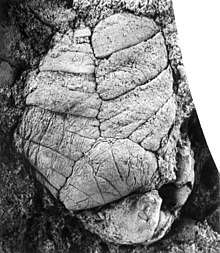Ventogyrus
Ventogyrus is an Ediacaran fossil found in the White Sea-Arkhangelsk region of Russia. It was originally thought to have a "boat shaped" form. However, it is now believed to have been made of three modules, all connected by a central rod. [1] Each of the modules has a single long wall running down it. Attached to these walls are numerous transverse walls which divide the modules into chambers of decreasing size. [1] It is 6 cm in diameter and 12 cm long. [2]Its three-fold symmetry is also seen in other Ediacarans. [1]
| Ventogyrus | |
|---|---|
 | |
| A Ventogyrus fossil | |
| Scientific classification | |
| Kingdom: | †Vendobionta |
| Genus: | †Ventogyrus Ivantsov and Grazhdankin 1997 |
| Species | |
| |
Ventogyrus is unique among Ediacaran fossils because there are have been numerous findings preserved in three dimensions. The quality of its complex anatomical preservation is also unique among Ediacarans. [1] This allows paleontologists to more accurately conceive of how it, and other species similar in morphology, lived in and interacted with its environment.
Ventogyrus is also unusual amongst vendobionts in having a suspected (if still controversial) affinity with a post-Ediacaran organism: Erytholus from the Cambrian[2].

Internal anatomy
It is thought that the internal chambers of Ventogyrus could have been filled with gas or bodily fluids. These chambers are only preserved when they are filled with sand, indicating that there may have been no cellular material within. The purpose of gas chambers within Ventogyrus would have likely been to maintain buoyancy and float above the sea floor.[1]
It is also suggested that there was a stem attached to the body of Ventogyrus. Specimens with an intact basal side show the presence of a triangular cross-section with a circular structure in the center. It is possible that this is where a long stem may have attached. The purpose of such a stem would be to either tether Ventogyrus to the sea floor or act as a general stabilizer. [1]
Ventogyrus also has three distinct longitudinal chambers. Each of these chambers contains alternating lateral branches. Together, these branches make up an internal network. It is possible that this network was part of a circulatory system. [1]
Fossil endangerment through piracy
Findings from studies on fossils from the Arkhangelsk region have been published in many popular science magazines and newspapers. These fossils have also been exhibited in the museums in Moscow, St. Petersburg, and Arkhangelsk. Due to this exposure, there has been an interest in collecting them, legally and illegally. Illegal sales often take place over the internet.[3] Many scientific papers have used fossil contents as references which were obtained illegally. [3]
References
- Fedonkin, M. A.; Ivantsov, A. Y. (1 January 2007). "Ventogyrus, a possible siphonophore-like trilobozoan coelenterate from the Vendian Sequence (late Neoproterozoic), northern Russia". Geological Society, London, Special Publications. 286 (1): 187. Bibcode:2007GSLSP.286..187F. doi:10.1144/SP286.14. Retrieved 4 June 2018.
- Retallack, Gregory (15 November 2011). "Problematic megafossils in Cambrian palaeosols of South Australia". Palaeontology. 54 (6): 1223–1242. doi:10.1111/j.1475-4983.2011.01099.x.
- Fedonkin, Mikhail (2009). "Paleo-piracy endangers Vendian (Ediacaran) fossils in the White Sea - Arkhangelsk region of Russia" (PDF). Notebooks on Geology. 03: 105. Retrieved 6 June 2018.